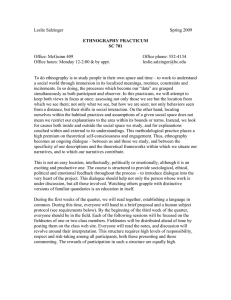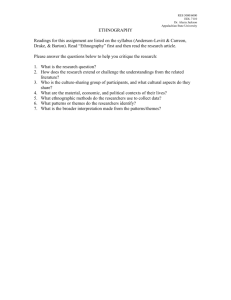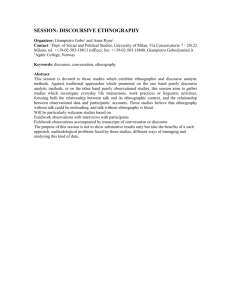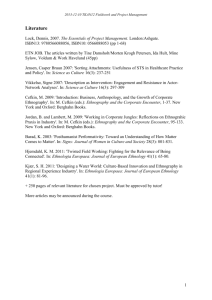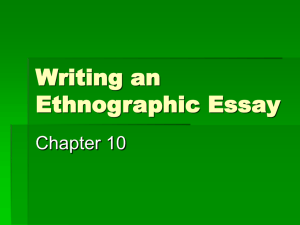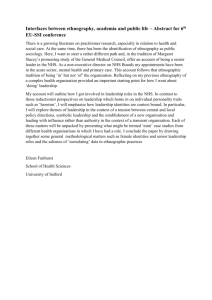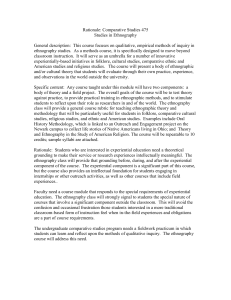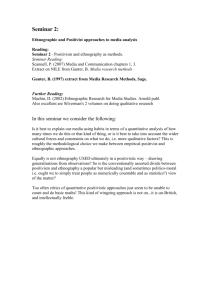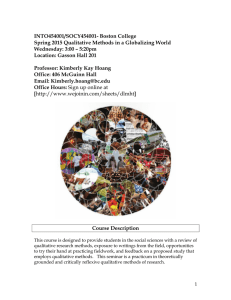Document 11323999
advertisement
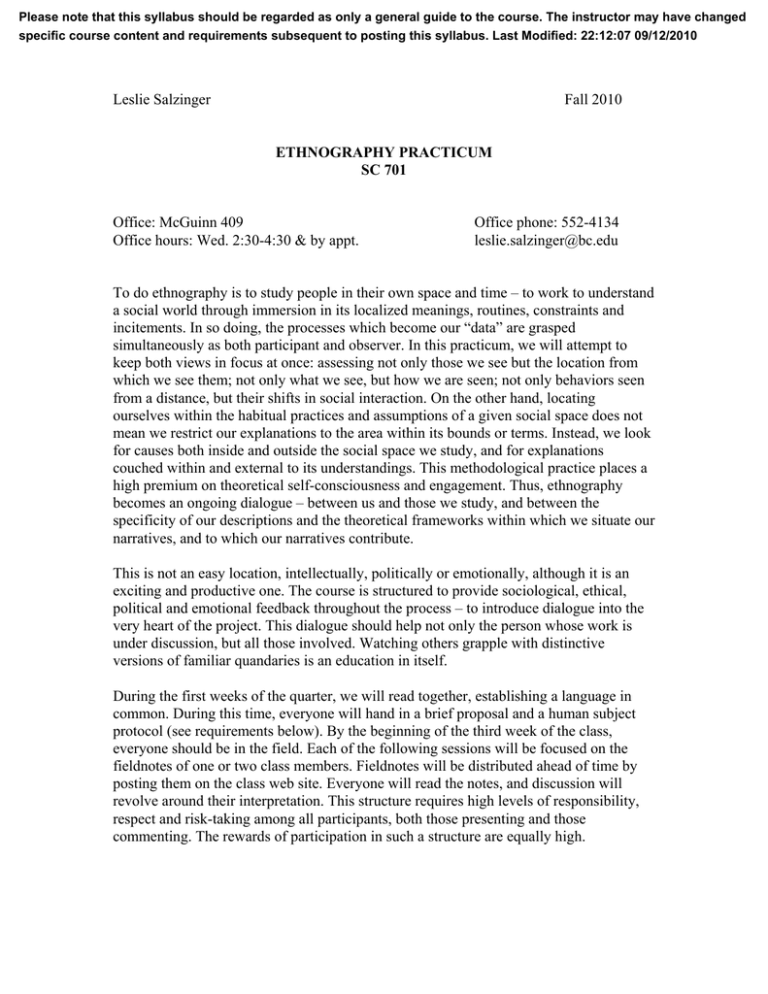
Please note that this syllabus should be regarded as only a general guide to the course. The instructor may have changed specific course content and requirements subsequent to posting this syllabus. Last Modified: 22:12:07 09/12/2010 Leslie Salzinger Fall 2010 ETHNOGRAPHY PRACTICUM SC 701 Office: McGuinn 409 Office hours: Wed. 2:30-4:30 & by appt. Office phone: 552-4134 leslie.salzinger@bc.edu To do ethnography is to study people in their own space and time – to work to understand a social world through immersion in its localized meanings, routines, constraints and incitements. In so doing, the processes which become our “data” are grasped simultaneously as both participant and observer. In this practicum, we will attempt to keep both views in focus at once: assessing not only those we see but the location from which we see them; not only what we see, but how we are seen; not only behaviors seen from a distance, but their shifts in social interaction. On the other hand, locating ourselves within the habitual practices and assumptions of a given social space does not mean we restrict our explanations to the area within its bounds or terms. Instead, we look for causes both inside and outside the social space we study, and for explanations couched within and external to its understandings. This methodological practice places a high premium on theoretical self-consciousness and engagement. Thus, ethnography becomes an ongoing dialogue – between us and those we study, and between the specificity of our descriptions and the theoretical frameworks within which we situate our narratives, and to which our narratives contribute. This is not an easy location, intellectually, politically or emotionally, although it is an exciting and productive one. The course is structured to provide sociological, ethical, political and emotional feedback throughout the process – to introduce dialogue into the very heart of the project. This dialogue should help not only the person whose work is under discussion, but all those involved. Watching others grapple with distinctive versions of familiar quandaries is an education in itself. During the first weeks of the quarter, we will read together, establishing a language in common. During this time, everyone will hand in a brief proposal and a human subject protocol (see requirements below). By the beginning of the third week of the class, everyone should be in the field. Each of the following sessions will be focused on the fieldnotes of one or two class members. Fieldnotes will be distributed ahead of time by posting them on the class web site. Everyone will read the notes, and discussion will revolve around their interpretation. This structure requires high levels of responsibility, respect and risk-taking among all participants, both those presenting and those commenting. The rewards of participation in such a structure are equally high. Requirements: 1. Minimum 11 weeks of fieldwork (6-10 hours weekly plus fieldnote writing). 2. Brief proposal describing your site, the questions you bring to it and what you expect to find and first draft of IRB forms. Due September 15. 3. Human Subjects’ Rights Protection protocol. Due September 22. 4. Two sets of fieldnotes, to be posted on the class web site. Dates vary. 5. Thorough, attentive, constructive reading of and commenting on your colleagues’ work. If you absolutely must miss a session in which others are presenting work, email them comments in writing (copied to me) by the following Thursday. 6. Discussion of the literature within which you plan to situate the final paper. Due November 3. 7. Analytic empirical paper based on your ethnographic data. Due Dec. 17. No incompletes. Materials: For sale at the BC Bookstore and on reserve at O’Neill Library: Ethnography Unbound: Power and Resistance in the Modern Metropolis edited by Michael Burawoy et al (Berkeley: University of California Press, 1991). Tales of the Field: On Writing Ethnography by John Van Maanen (Chicago: University of Chicago Press, 1988). Writing Ethnographic Fieldnotes by Robert Emerson, Rachel Fretz and Linda Shaw (University of Chicago Press, 1995). All other materials are on e-reserve at O’Neill Library: Download at http://www.bc.edu/research/oric/human.html Human Subjects’ Protection Protocol Forms Course Schedule: Ongoing: Writing Ethnographic Fieldnotes by Robert Emerson, Rachel Fretz and Linda Shaw (University of Chicago Press, 1995). Pages 1-141 by the end of September and pages 142-210 by the end of October. We will NOT discuss this in class, but I think you’ll find it useful in the fieldwork. September 8: Introduction. September 15: “Situated Knowledges: The Science Question in Feminism and the Privilege of Partial Perspective” by Donna Haraway in Feminist Studies 14:3 (Fall 1988). Pages 575-599. 2 “An Explanation” in Pig Earth by John Berger (New York: Pantheon Books, 1979). Pages 5-12. “Introduction,” Death without Weeping: The Violence of Everyday Life in Brazil by Nancy Scheper-Hughes (Berkeley: University of California Press, 1992). Pages 1-30. “Objectivity Shock” and “Epistemologies of the Eye” in Objectivity by Lorraine Daston and Peter Galison (Zone Books, 2007). Pages 11-53. and The Belmont Report, The National Commission for the Protection of Human Subjects of Biomedical and Behavioral Research, US Department for Health, Education and Welfare. 1979 (http://ohsr.od.nih.gov/guidelines/belmont.html). Research on Human Subjects: Academic Freedom and the Institutional Review Board, American Association of University Professors. 2006 (http://www.aaup.org/AAUP/comm/rep/A/humansubs.htm). “Don’t Talk to the Humans: The Crackdown on Social Science Research” by Christopher Shea, Lingua Franca 10:6 (September 2000). September 22: “Grounded Theory in the 21st Century” by Kathy Charmaz in The Sage Handbook of Qualitative Research, 3rd edition by Norman Denzin and Yvonna Lincoln (Sage Publications, 2005). Pages 507-535. “The Extended Case Method” in Ethnography Unbound: Power and Resistance in the Modern Metropolis, Michael Burawoy et al (eds.) (Berkeley: University of California Press, 1991). Pages 271-287. “The Extended Case Method” by Michael Burawoy in Sociological Theory 16:1 (March 1998): 4-33. “Two Cases of Ethnography: Grounded Theory and the Extended Case Method” by Iddo Tavory and Stefan Timmermans, Ethnography 10:3 (2009): 243-263. Four fieldnote presentation classes. October 27: Tales of the Field: On Writing Ethnography by John Van Maanen (Chicago: University of Chicago Press, 1988). Pages 1-12; 45-124. “Ire in Ireland” by Nancy Scheper-Hughes in Ethnography 1:1. Pages 117-140. “On Ethnographic Authority” in The Predicament of Culture by James Clifford (Cambridge: Harvard University Press, 1988). Pages 21-54. 3 Date TBD (possible public presentation Nov. 12): Introduction to computer-based qualitative research packages. Four fieldnote presentation classes. December 9: General discussion Final papers due December 17. 4
